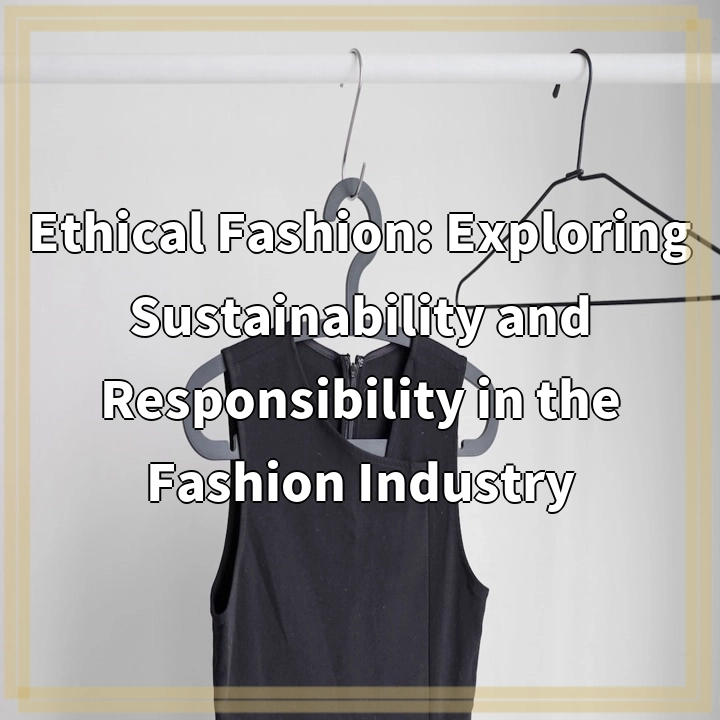
What is Ethical Fashion?
Ethical fashion refers to the movement within the fashion industry that prioritizes both social and environmental sustainability. It encompasses various practices, including fair trade, eco-friendly materials, ethical labor practices, and animal welfare considerations. The goal of ethical fashion is to ensure that the entire fashion supply chain is transparent, responsible, and accountable.
Real-World Problems Associated with Ethical Fashion
While the concept of ethical fashion holds immense importance, the fashion industry still faces several challenges and real-world problems that hinder progress:
1. Exploitation of Workers
One of the most prevalent issues in the fashion industry is the exploitation of workers. Many garment workers endure long hours, low wages, unsafe working conditions, and even child labor. This problem is particularly acute in developing countries where labor laws and protections may be weak or nonexistent.
2. Environmental Impact
The fashion industry is notorious for its significant environmental footprint. From the use of toxic chemicals in textile production to the massive amounts of water consumption and carbon emissions, the industry contributes to pollution, deforestation, and resource depletion.
3. Fast Fashion Culture
Fast fashion, characterized by the rapid production and consumption of cheap clothing, promotes a culture of disposability. It leads to excessive waste generation as clothes are discarded quickly, which further exacerbates the environmental impact and perpetuates unsustainable production methods.
4. Lack of Supply Chain Transparency
The lack of transparency in the fashion supply chain makes it challenging to hold brands accountable for their ethical claims. Secrecy within the production process enables unethical practices to go unnoticed and unchecked.
5. Animal Cruelty
The fashion industry’s use of animal-derived materials, such as fur, leather, and exotic skins, raises concerns about animal cruelty. The sourcing of these materials often involves intensive farming practices and inhumane treatment of animals.
Addressing these real-world problems is essential for transforming the fashion industry into a more ethical and sustainable one. By raising awareness, demanding transparency, and supporting brands that prioritize social and environmental responsibility, consumers can contribute to positive change in the fashion industry.

Solutions for Ethical Fashion
Addressing the problems associated with ethical fashion requires collective effort from consumers, brands, and the industry as a whole. Here are some solutions to promote sustainability and responsibility in the fashion industry:
1. Embrace Fair Trade and Ethical Certifications
Support brands that prioritize fair trade practices and hold certifications like Fairtrade International and Global Organic Textile Standard (GOTS). These certifications ensure that workers are paid fair wages, working conditions are safe, and environmental standards are met.
2. Shift Towards Sustainable Materials
Promote the use of sustainable and eco-friendly materials like organic cotton, hemp, bamboo, and recycled fabrics. These materials have a lower environmental impact and reduce the reliance on harmful chemicals and resources.
3. Adopt Slow Fashion Principles
Encourage the adoption of slow fashion principles, which focus on quality over quantity. By investing in well-made, durable garments, consumers reduce the demand for fast fashion and contribute to a more sustainable fashion industry.
4. Support Thrift Shopping and Clothing Swaps
Engage in thrift shopping and clothing swaps to extend the lifespan of garments and reduce waste. This promotes a circular economy where clothes are reused, repaired, or repurposed instead of ending up in landfills.
5. Demand Transparency and Accountability
As consumers, demand transparency from brands regarding their supply chains. Support companies that disclose information about their sourcing practices, ethical standards, and environmental impact. This creates an incentive for brands to improve their practices and be held accountable.
6. Educate and Advocate
Spread awareness about ethical fashion through education and advocacy. Share information about the issues and solutions through social media, blogs, or local community events. By empowering others with knowledge, we can collectively drive change.
By implementing these solutions, we can work towards a fashion industry that is socially and environmentally responsible, ensuring a more sustainable and ethical future.















